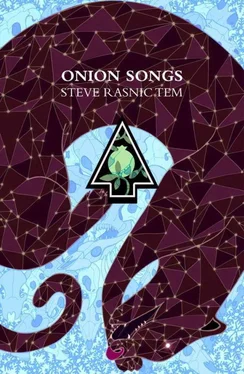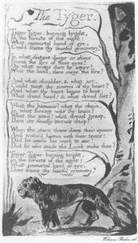Degaré did his wanderings during the day. Sometimes they would pass each other on the disastrous stairs leading to the attic room they now shared. Malcolm’s roommate occasionally growled at him, little more. He did not know what Degaré did during the day, although he suspected criminal activity was involved, as the man returned every evening with his enormous carcass swollen even further with hidden cheeses and breads under his coat, as well as wrapped packages whose contents obviously surprised Degaré when he ripped them open.
One evening Malcolm found a few drops of blood on one of the bread loaves. Their eyes found each other, Degaré’s swollen and angry. “Do you wish to make une réflexion , Monsieur?”
In answer Malcolm stared and began eating the bloodied area.
Sometimes after an extended period in bed Malcolm felt very much the philosopher. What better place to construct his theories? His father might have said this was no way to make one’s way in the world, to which he might reply that neither the way nor the world was very clear. One invention of meaning was as near the truth as any other as far as Malcolm was concerned. There was no sense having a heart attack over such questions, which his father, indeed, had.
Lying in bed he had the opportunity and the will to review and reflect upon his life, something which even the wealthy could not always afford. It gradually came clear to him that a single human being could not have possibly felt and done all the things he had felt and done in such a relatively short time. One being could not possibly contain such conflicts of feeling. He was a man of some education and yet he had eaten bread soiled with a stranger’s blood. And the repugnant Degaré? Sometimes his roommate recited French love poetry in his sleep, with very few mistakes. Such conflicts of spirituality and bestiality! The usual explanations for such contradictions made less sense the longer Malcolm remained in bed. He himself hated the ugliness and falseness of the world, and yet loved the heightened sensibility his hatred brought him. He had absolutely no hope or optimism for his own future, and yet it was a future he looked forward to with great anticipation.
The true mystery was why more did not go mad when forced to endure these conditions. Malcolm concluded there must be a surfeit of souls in heaven (or whatever one chose to call that astral realm) and a shortage of flesh in the mundane world to serve as their vessels. Even when madness was not the immediate result, to live with such internal warfare had to lead inevitably to the vilest sort of illnesses.
In one sense these were merely the idle speculations of a man with no other pressing chores. But Malcolm was taken aback to discover that these ideas triggered emotions he had not experienced in years. Of course he had no one reputable to bear witness to these recent enlightenments. He had no real acquaintances, actually, other than the disreputable Degaré. And so it was that one late evening while engaged in one of their increasingly rare shared dishwashing jobs, the kitchen explosive with heat and argument, a porridge of loose food underfoot, he pulled the giant Frenchmen out into the alley and told him all that he had surmised on the subject.
To Malcolm’s somewhat uncomfortable surprise Degaré actually appeared interested, nodding and sucking in his cheeks, periodically staring at Malcolm with a sympathetic look on his face. Finally, when Malcolm was not yet finished but too exhausted to go on, Degaré turned to him with a dripping ladle raised like a wand and spoke. “I may know just the man who can help you with this problem. He’s a German. He comes to Paris from time to time for various studies, experiments, and God knows what. He dresses very finely, oriental robes, silk scarves, even when he is renting the poorest of hovels to preserve his privacy. You might think he was simply some sharp-tongued dandy, but he is educated, a writer, or so I’ve been told—he certainly weaves magic with his words—who knows deeply the issues of mind and spirit.”
“What is his name?”
“Oh! He has so many! When I first met him he was Meyer, but I have heard others call him Dagobert, and Ruben-Juda. He is quite fluid, let us say, in his allegiances. He joins associations only to tear them down it would seem. I can never tell if the man is serious! But that is simply a symptom of his brilliance, I think.”
“You would seem to know him well.”
“ Un peu . I have done the occasional odd job. I have acquired a particular ingredient he has desired, now and then. What can I say? The man talks, I listen, I have learned a bit of his situation. Perhaps he can help you. He is known among certain, say, circles impopulaire for—hmmm— le processus de arrachage?”
“I don’t understand.”
“How do you say? An extraction process?”
“Is that dentistry you’re referring to?”
Degaré laughed. “ Non! Ne dentiste! Surely there cannot be a physical process for such a thing. It is philosophical, spiritual. No danger, or so I am told. How could there be? You can have my spirit, Monsieur , I give it gladly, if you will only feed my belly, and other things.”
Malcolm shuddered at what he thought the Frenchman might be suggesting. “Where do I find this magician?”
“Why, only a short stroll to the east, I think you know it? The Rue D’âmes Vidées? I will give you the precise address, for, say, a bit of innocuous cheese?”
* * *
As Degaré had promised, the Rue D’âmes Vidées was a short stump of a lane a few minutes stumble toward the river. Malcolm had not been familiar with this particular segment of pavement, although he was aware of other parts of this street from the conversations of others. It had once been one of the longest streets in Paris, a north-south slash through the city’s heart, but over the centuries it had been broken up, blocked by one project or other, canals or public buildings, or occasionally when some housing development was extended across its surface like a dam across a stream. Streets required advocates if they were to remain intact, but this street had none. Now its longest segments were only a few blocks— Rue Abattue D’enfant was one of the siblings, he believed, as well as the Rue des Veuves Aveugles , and the petite route des fenêtres chuchotantes —and here and there, at least according to rumor, a section would be completely enclosed on all four sides, becoming a cour , a courtyard, or forgotten completely on the other side of windowless walls.
Malcolm could not escape the perception of mytaphore , metaphor, in the history of this road and his theory regarding developments in the human personality. Isolated, diverted, and segmented all came to mind when he contemplated the nature of the human spirit.
The door to No. 56 Rue D’âmes Vidées , if that sunken slab of wood could be called such, was dragged open with surprising ease by a handsome man in a fine robe. Malcolm felt immediate intimidation—there was a piercing, electric quality to the man’s eyes as they gazed, unblinking.
“ Excusez-moi, Monsieur . I was told, I believe, there is a, arrachage?” He knew he must sound like a fool, but how do you ask about such things?
The man on the other side of the door said nothing, those eyes examining Malcolm up and down with unsettling calm. He made a little wrinkle with his mouth and stepped out of the way.
They moved through the darkness before settling into a sour-smelling room, lit only by a blazing fire. Even though Malcolm was accustomed to working in the hottest of Parisian kitchens, he found the heat in this room almost too much to bear but his host appeared unperturbed, his high forehead dry, unwrinkled. But not undamaged. Closer up, the man’s face appeared scraped, flaking, as if there might be layers of skin missing. “Tell me your story, if you would,” he said.
Читать дальше












